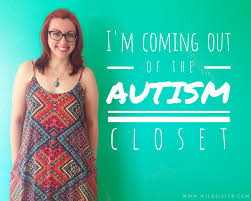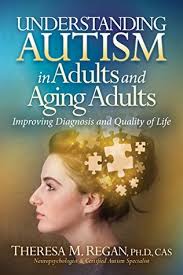
“I wish it would
stop,” says Allen.
There are tears in the corners of his eyes as he leans
against the door-frame of my office. The conversation has not been easy: two of
his least favorite subjects are work and therapy. It has taken us 45 minutes to
sift through denials, defenses, and deterrents, but I have been determined and
patient.
“I’m just angry a lot,” he says, and I nod. Just last month I needed
to replace his bedroom door, which had taken abuse for years. “I’m angry that I
was in school for all those years—ALL THOSE YEARS—and not one person said
anything about autism! Not one! Yeah, they said I was different and quirky and
stuff, but no one said autism. And I want to know why. Cause now I know I have
it and I just don’t know what to do with it!”

I clench my fists. I, too, am angry about it. Allen was
diagnosed at age 3 with learning disabilities caused by high blood ammonia. He
spent his school years in the special education classrooms, struggling to keep
up with his age-mates. Every year, I participated in the IEP conference to set
his goals. And during the 12 years of his public schooling and the 4 years of
college, no one mentioned autism. Not once. According to the Asperger’s/Autism
Network, adults who receive the diagnosis often deny it or express anger that
“no one ever told me.” The site did not mention how their parents feel.
But I am plowing ahead with my end goal; I figure I have
enough good will chips with Allen to either convince him to see a therapist or
continue to go to work. I talked with his sister yesterday and we agreed that,
for the time being, helping Allen become more aware of his strengths and his
needs for accommodations place therapy above work. For two years, he has been
receiving disability benefits and they will be enough to keep up with his car
and insurance payments for the time being.

I’ve made this confession to my daughter and my best friend:
I want Allen to be normal. Having a job he goes to everyday makes him normal. I
already have enough “not normal” in my life with a husband whose physical disabilities
put him out of work 18 years ago. I crave some normalcy.
But God, in His infinite wisdom, has blessed me with a son
who resides on the upper edges of the ASD spectrum, a place sometimes called
High-Functioning Autism (HFA). It’s a different plane from the one that I live
on. I spent Allen’s childhood helping him find ways to learn, not preparing him
for life as an autistic adult.
“I just want it to stop,” says my son. “Mom, just make it
stop.”
My heart breaks a little. I wish I could make it stop for my
blue-eyed baby boy. I take a deep breath, whisper a prayer, and tell him how
wonderful and creative he is.
“Unique,” he reminds me. “You always said I was unique.”
I smile a little. “We are all unique. We just need to learn
how to use it.”
He nods, thinking. I let the wheels in his brain turn,
praying that I am somehow getting through to him.

Allen is not alone in his adult diagnosis. According to
Advancing Futures for Adults with Autism (2017), 1.5 million people in the
United States are on the spectrum, with the possibility of what is sometimes
called “the autism Tsunami” in our near future. As in Allen’s case, employment
and education is not really a matter of lack of ability or intelligence, it is
a lack of available services and public understanding. The phrase, “If you know
one person with autism, you know one person with autism,” is very true. As a
spectrum disorder, it takes many forms. And communicating with someone on the
spectrum is full of pitfalls such as perception deficits, abrupt transitions,
and echolalia (Asperger Partner, 2016).
A few tears have fallen by now but Allen’s determination to
avoid therapy is waning. We have agreed to refer to his new therapist, Dana, as
a “career counselor” rather than a therapist. “Because you need someone to help
you sift through all your wonderful ideas and see which one you should work on
first.” And because, I think to myself, you need someone to talk to other than
me. The role I play as Allen’s mother is exhausting.

Allen is quickly running out of steam, so I make one last
plug. “If you need to quit your job,” I say, “It’s okay. You need to do what’s
best for you.”
He cocks his head to the side. “I guess I don’t mind the job
so much,” he says. “Not as long as there is work to do. I just don’t like doing
nothing.”
My brain is already turning with how we can address this situation.
Then Allen, who often surprises me, says this: “Guess I can talk to Dana about
it.”
Then he heads to his room for a nap and I, feeling as if I
have run the gauntlet and come out the other side, go downstairs to make
supper. And treat myself to a cup of tea and a cookie.





